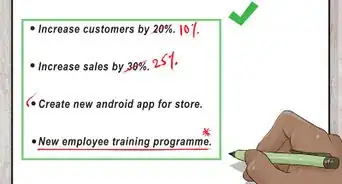This article was co-authored by Colleen Campbell, PhD, PCC. Dr. Colleen Campbell is the Founder and CEO of The Ignite Your Potential Centers, Career and Life Coaching based in the San Francisco Bay Area and Los Angeles. Colleen is an International Coach Federation accredited Professional Certified Coach (PCC). Colleen received her MA and PhD in Clinical Psychology from Sofia University and has been career coaching since 2008.
This article has been viewed 17,677 times.
It is never too early to start talking to your child about career choices. As a parent, there are several things you can do to support them through the process. Even the most driven people need some external motivation. You can also serve as a trusted mentor to guide them with their wisdom and advice. Just remember that finding the right career path takes time and structure.
Steps
Help Your Child Identify Their Skills
-
1Have a discussion with your child about their interests. Ask your child what their favorite subject is in school. Discuss your child’s hobbies and extracurricular activities. Make note of what they are good at as well as what they enjoy. Listen and be supportive of things that your child shows interest in during this discussion.
- You might start the discussion by saying something like “So what is your favorite class this year?”
- For example, they might enjoy math and basketball, but only be good at math.
-
2Use career assessment tools to help pinpoint your child’s strengths. Your child is still growing and developing into an adult and may be surprised to find out that they have specific strengths that could be beneficial in a profession. Tools such as personality assessments and standardized tests such as the SAT or ASVAB are designed to pinpoint a child’s strengths. Understanding their strengths will allow them to start looking at professions that will allow them to use their unique talents.
- For example, some children really have a knack for technology. If this is the case, a career in an IT field might be a great fit.
Advertisement -
3Schedule a meeting with your child’s school guidance counselor. They often have career assessment tools that can help to narrow down career fields. They will also have record of your child’s grades and school achievements which might aid your discussion with your child.
- You can ask your child's guidance counselor: "Do you know of any particular tools that we could use to explore career opportunities for Mike?"
-
4Discuss what tasks are deal breakers. Everyone has a task or set of tasks that they want to avoid at all costs. You should be upfront with your child to recognize what these things are for them. Knowing what they do not like doing will help them steer clear of professions that heavily expect them to do things they don’t like. Bring up tasks that you know your child struggles with and discuss how they might apply in a career.
- For example, you might say something like “I know you complain about your math homework every night. Are you sure you want to be an accountant?”
Discuss Career Options
-
1Research different career options with your child. Use the skills and interests that you identified with your child to guide your research. Include things like salary range, benefits package, and typical work schedule for each profession you research. You can find information about different career fields online, at career fairs, and by consulting professionals and companies in that field.[1]
-
2Discuss locations with your child. Ask your child where they would like to live as an adult. Your career often dictates where you will be living. If location is important to your child they need to understand what their career options are in that particular location. The amount of travel you do for family, business, or vacation will also be heavily influenced by your career choices.
- For example, a marine biologist is likely to live near an ocean. A coal miner does not typically reside in New York City.
-
3Look beyond traditional careers. Common careers such as teachers, doctors, and lawyers are discussed frequently. Many children will have no interest in these fields, and should be exposed to newer or more unique fields. Science and technology fields are changing every day, as are the arts. Be open to looking at nontraditional careers as well as the tried and true careers.[2]
- For example, the internet has given rise to a huge demand for bloggers. This profession did not even exist a hundred years ago, but it is now a viable way to make a living.
-
4Talk to people who work in fields of interest to your child. You can find professionals in almost any field in the phonebook or online. Contact them and see if they would be willing to meet with your child. A first hand account is often more telling than the research statistics you find online. Have your child request a meeting with them and set out a list of questions to ask them. Some examples might be:
- What does their day-to-day work schedule look like?
- What sort of education or training did they need to qualify for this position?
- What is the typical pay for this profession?
- Do they enjoy their work?
Create a Career Plan
-
1Discuss multiple possibilities with your child. Plans are subject to change for many reasons. Create alternative plans in case their chosen profession doesn’t work out for some reason. Alternate plans in the same field, or a closely related field, are less costly and more time efficient. This way your child is well prepared if their chosen profession doesn’t work out as planned.
- Your child might be interested in becoming a physician. It is a good idea to also come up with alternate plans in the same field. They could also become a high school biology teacher or a nurse.
-
2Research the education or training required. Understand the prerequisites needed to be accepted into that educational or training program. It is also important to know the costs of the education or training and develop a plan to pay for or finance it. It might be a good idea to ask people who are currently training in that field and talk to them about what their day-to-day life is like.[3]
- Schedule a college visit with your child or take your child to see a vocational training program.
-
3Encourage your child to gain experience in their field. Networking and experience are just as important as education and training. There are several ways to gain experience and contacts in a particular field including volunteering, shadowing, and internships. Explain to your child that the more leadership they take, paid or unpaid, the more seriously they will be taken in the future by employers.
- Teens should start building their resume as early as possible.
Expert Q&A
Did you know you can get expert answers for this article?
Unlock expert answers by supporting wikiHow
-
QuestionHow can I help my child choose a career?
 Colleen Campbell, PhD, PCCDr. Colleen Campbell is the Founder and CEO of The Ignite Your Potential Centers, Career and Life Coaching based in the San Francisco Bay Area and Los Angeles. Colleen is an International Coach Federation accredited Professional Certified Coach (PCC). Colleen received her MA and PhD in Clinical Psychology from Sofia University and has been career coaching since 2008.
Colleen Campbell, PhD, PCCDr. Colleen Campbell is the Founder and CEO of The Ignite Your Potential Centers, Career and Life Coaching based in the San Francisco Bay Area and Los Angeles. Colleen is an International Coach Federation accredited Professional Certified Coach (PCC). Colleen received her MA and PhD in Clinical Psychology from Sofia University and has been career coaching since 2008.
Career & Life Coach Look at your child’s personality, strengths, and values when you’re thinking about what career is a good fit. Then, figure out what needs to be in place for your child to thrive and ask what the pivot points are from where they stand and where they can go. When you start vetting these career ideas and potential pivot points, do online research and look up what the career is like day-to-day, to get a better idea of whether your child will thrive.
Look at your child’s personality, strengths, and values when you’re thinking about what career is a good fit. Then, figure out what needs to be in place for your child to thrive and ask what the pivot points are from where they stand and where they can go. When you start vetting these career ideas and potential pivot points, do online research and look up what the career is like day-to-day, to get a better idea of whether your child will thrive.
Warnings
- Your child may change their mind several times. As your child learns they might develop a strong interest in something different.
- Many career choices require high academic or physical achievement. Even if your child is trying their best, they may not meet the requirements. Creating alternate plans can help alleviate your child’s disappointment.






































































